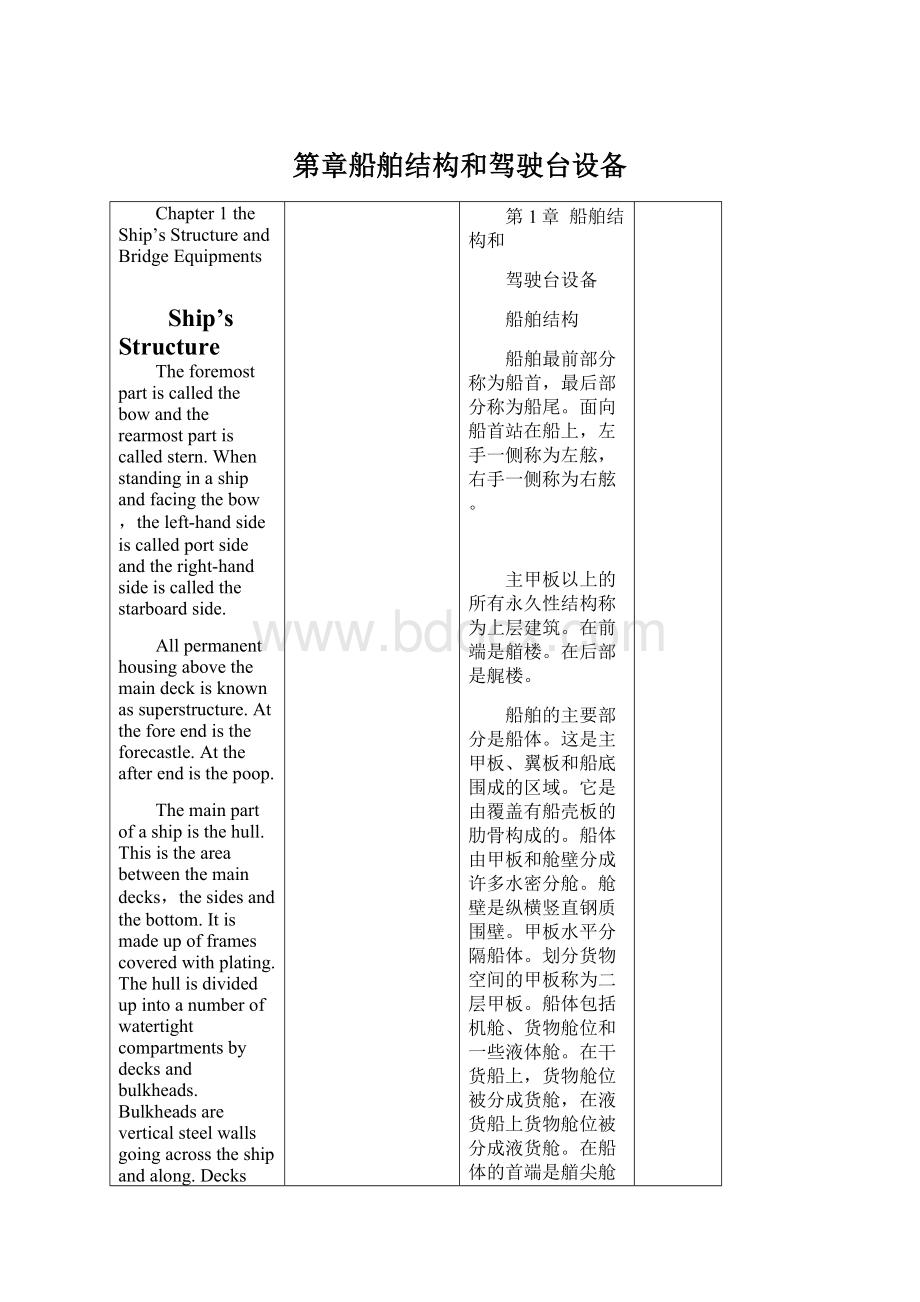第章船舶结构和驾驶台设备Word文档下载推荐.docx
《第章船舶结构和驾驶台设备Word文档下载推荐.docx》由会员分享,可在线阅读,更多相关《第章船舶结构和驾驶台设备Word文档下载推荐.docx(24页珍藏版)》请在冰豆网上搜索。

第1章船舶结构和
驾驶台设备
船舶结构
船舶最前部分称为船首,最后部分称为船尾。
面向船首站在船上,左手一侧称为左舷,右手一侧称为右舷。
主甲板以上的所有永久性结构称为上层建筑。
在前端是艏楼。
在后部是艉楼。
船舶的主要部分是船体。
这是主甲板、翼板和船底围成的区域。
它是由覆盖有船壳板的肋骨构成的。
船体由甲板和舱壁分成许多水密分舱。
舱壁是纵横竖直钢质围壁。
甲板水平分隔船体。
划分货物空间的甲板称为二层甲板。
船体包括机舱、货物舱位和一些液体舱。
在干货船上,货物舱位被分成货舱,在液货船上货物舱位被分成液货舱。
在船体的首端是艏尖舱,尾端是艉尖舱。
它们是用于装淡水和压载水的。
船体的货舱和船体之间的空间是双层底。
它们是用于装压载水和燃料的。
(bemadeupof…由……构成)
(watertightcompartment水密分舱)
(thefore-peaktank艏尖舱)
(theafterpeaktank艉尖舱)
(doublebottomtank双层底舱)
Themaindeckcoversthecargospacesorholds.Thereareopeningscutinthedeck,andtheseopeningsarethehatches,onetoeachhold.Shipsuseeithercranesorderrickstoliftthecargointotheholdanddischargeit.Aderrickissimplyastrongboom,madeofsteel
orwood,thatcanswingfromsidetoside.Awirefromapowerfulwinchrunsoverablockattheheadofthederrick.It’squiteasimplearrangement.Acraneisusuallyamuchmore
complicatedandexpensivepieceofliftingmachinery.Butalotofshipsarefittedwithcranes.
Theforecastleonashipisasmallextradeckabovethemaindeck,forwardofnumberonehold,rightupinthebows.Itcarriestheanchorsandtheircables.Thewindlassisforraisingandloweringtheanchors.Therearetheportandstarboardcablestoppersontheforecastle.Thecablecomesupfromthecablelockerthroughthespurlingpipe,overthegypsyonthewindlass,throughthestopperanddownthroughthehawse-pipe.Rightforwardoftheforecastleisthejackstaff.
Theforecastleheadiswherethechiefofficerisstationedwhenthevesseliscomingtoaberthoramooring.Thesecondofficerisonthepoop,readytolookafterthesternmooringlinesorhawsers.Inthisway,thetwoendsoftheshipcanbesecuredaspreciselyandquicklyaspossible.Thereisanensignstaffrightaftofthepoop.
Therearetwoopenwingsofthebridge.Theyprojectouttothefullwidthoftheshiponeachside,portandstarboard.Inbetweenisthewheelhouse;
that’senclosedforprotectionfromtheweather.Andabovethewheelhouseisthestandardcompassplatform,onegoodmagneticcompassisputthereasfaraspossiblefromtheship’smagneticfield.Andthat’sthecompasstheycallthe“standard”.Thestandardcompassissupposedtohavequitealotlessdeviationerrorthanthemainsteeringcompass.Butactuallyweuseagyrocompassnearlyallthetime.
Thereareseveralpairsofmooringbittsandfairleadfittedwithrollersalongthedeckforwiresandwarps.Therollerfairleadscancutdownchafeandfriction,sotheownersaregladtoreducewearandtear,byusingrollerfairleadsallovertheplace.
Atraditionalgeneralcargoshiphasherengineroomandbridgesuperstructureamidships.Shemayhavethreeholdsforwardofthebridgeandtwoholdsaftofthebridge.Derricksaresupportedbymastsandsamsonposts.Theyaresowedforeandaftwhentheshipisatsea.Thereareenoughlifeboats,ontheportandstarboardsideamidships.
Ashipismadefasttothequaysidebymooringlines.Thestandardmooringlinesconsistofheadline,forwardbreastlineandforwardspringlineandsternline,aftbreastlineandaftspringline.Anyoftheselinesmaybedoubled.Eachlinehasalargeeyesplicedintheend.Theeyeisplacedoverabollardonthequayside.Ifthereisanotherlinealreadyonthebollard,theeyeofthesecondlineshouldbetakenupthroughtheeyeofthefirstlinebeforeplacingitoverthebollard.Thismakesitpossibleforeitherlinetobeletgofirst.
BridgeEquipment
Assoonaspossibleafterjoiningashipandbeforetakingoverthefirstwatch,awatchofficermustbecomefamiliarwithallbridgeandassociatedchartroomequipment,itsuse,operation,capacity,andlimitations.Instructionsandmanualsissuedwiththeequipmentmustbestudiedandcloselyfollowed.Sincemodelsofbridgeequipmentvarywiththemanufacture,thereareavarietyofdifferentoperationalprocedures.
Thebridgeequipmentincludes:
radar;
magneticcompass;
gyrocompass;
theradiodirectionfinder;
echosounder;
GPSandDGPS;
steeringgearandtheautomaticpilot;
GMDSSequipments;
VHFetc.
1.Radar
Radar(RadioDirectionAndRanging)isamethodtodeterminedistanceanddirectionofobjectsbysendingoutabeamofmicrowaveradioenergyanddetectingthereturnedreflections.TheOOWmustkeepinmindthatradarismoreaccurateasarangingdevicethanasabearingdevice.Radarisatremendousadvantagebothasanavigationaidandasananticollisiondevice.Itcanbeusedinallconditionsofvisibility,butisparticularlyusefulinpoorvisibilityandatnight.FixescanbeobtainedrapidlyandanticollisionsolutionscanprovidetremendouspeaceofmindtotheOOW.Radarcanalsobeusedtolocateandtracksqualllinesandotherheavyweather.Inavoidingcollisionstheimportanceofvisualbearingscannotbeoverstressed.Visualbearingsandradarrangesprovidethebestearlyassessmentofthepossibilityofathreattoavessel.Oneradarmustbeonforearlydetection.Asecondradarshouldbeonatacloserangescale.Rangescalesmustbeappropriateforthecircumstances.WhenapilotisembarkeditisimportantfortheOOWtoensurethatoneradarisavailableforthepilotandtheotherisavailableforthemaster/OOW.TheOOWmustbeawareofthepossibilityofshadowsectorsduetotheship’ssuperstructure.Achangeofcoursecanunveiltheseareasforradardetection.
Nomatterhowgoodaradaris,itsvalueasanaidwillbeentirelydependentuponthepersonwhooperateit.TheOOWmustbefullyconversantwiththeradar’scapabilitiesandlimitationsinordertounderstandandinterprettheradarpicturecorrectly.Itisimportanttocarryoutradarpracticeinclearweatherwheneverpossibleinordertoobtaintheconfidenceandroutinethatisnecessaryforproperuseofradarinrestrictedvisibility.
Informationobtainedfromtheradarmustbeusedsothatearlystepscanbetakentopreventanyriskofcollisionfromarising.TheuseofradardoesnotunderanycircumstancerelievethenavigatoroftheobligationtomaneuverinaseamanlikemanneraccordingtotheprovisionsofRules.
Asradarbecomemoreautomated,itwillbeevenmoreimportantforwatchofficerstokeepabreastbycontinuingeducationandexperienceinprofessionalpractice.
2.GPSandDGPS
Aglobalnavigationsatellitesystemisasatellitesystemthatprovidesshipsfittedwithsuitablereceiverswithameansofobtainingcontinuousworldwideposition,timeandspeedinformation.TheGlobalPositioningSystem(GPS)orNavstaroperatedbytheUnitedStatesandtheGlobalNavigationSatelliteSystem(GLONASS)operatedbytheRussianFederationarecurrentlyavailableforcivilianuseonships.GPSofferscommercialusersaglobalpositioningcapabilitywithaccuracyoftheorderof100metres.DifferentialGPS(DGPS)receiversapplycorrectionstorawGPSsignalsdeterminedandtransmittedbyterrestrialmonitoringstations.DifferentialsignalscanbetransmittedtoshipsviasatellitesorusingHFradiolinks.WithinDGPScoverage,positionalaccuracyoftheorderof10metresatthereceiverantennaispossible.
3.EchoSounder(Fathometer)
Thisinstrumentproducesanunderwatersoundpulseandmeasurestheelapsedtimeuntilreturnofanechowhichisreceivedbyamicrophone.Thedepth,infeet,meters,orfathoms,isinterpretedaccordingtoanequation(depth=speed×
1/2timeintervalbetweensoundpulseandecho)andthendisplayedonanindicator.Displaysincluderotaryflashinglight,electricalmeter,digitalreadout,orbottomprofile.Whateverthedisplay,itisessentialthattheOOWbecertainwhatunitofmeasureandrangeisbeingused.Thisinstrumentshouldbeusedwhenevertheshipnavigateinwaterswherethedepthsmakeitserviceableandwherethesafenavigationoftheshiprequiresit.
Wheretheshipcarriesadepthrecorderwithanalarm,theechosoundershouldbeusedwhennavigatinginnarrowwatersandinallothercircumstanceswherethedepthofwatermakesitausefulaidthatmayincreasethesafenavigationoftheship.
Theechosounderisnotusedtoitsmaximumcapabilityaboardthebridgesofmostmerchantvessels.Itcanbeveryusefulinanapproachtoportorwhenmakingalandfallwheretherearedistinctdepthcontours,suchasthe100-fathomcurve,thatcangiveanOOWanexcellentlineofposition(LOP).ThisLOPcanbeutilizedwithacelestialLOP,visualbearing,and/orradarrangetoprovideanexcellentfix.Inaddition,alineofsoundingsmaybeusedasaaidindeterminingavessel’spositio